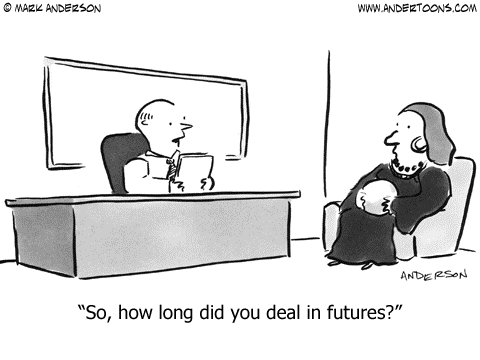A futures contract is an agreement between two parties – a buyer and a seller – wherein the former agrees to purchase from the latter, a fixed number of shares or an index at a specific time in the future for a pre-determined price. These details are agreed upon when the transaction takes place. As futures contracts are standardized in terms of expiry dates and contract sizes, they can be freely traded on exchanges.
A buyer may not know the identity of the seller and vice versa. Further, every contract is guaranteed and honored by the stock exchange, or more precisely, the clearing house or the clearing corporation of the stock exchange, which is an agency designated to settle trades of investors on the stock exchanges.

Futures contracts are offered on various kinds of assets, namely stocks, indices, commodities, currency pairs and so on. Buying and selling futures contract is fundamentally the similar as buying or selling a number of units of a stock from the cash market. The difference is without taking immediate delivery. In the case of index futures too, the index’s level moves up or down, replicating the movement of a stock price. So, basically trade in index and stock contracts is just the same way as trade in shares.
How to buy futures contracts
Technically, it is easy to buy futures. One of the prerequisites of stock market trading is a trading account. Having capital, in this sense, money is the obvious another requirement. However, this requirement is slightly different for the derivatives market.
When buying in the cash segment, paying the entire value of the shares purchased is required, this is unless you are a day trader utilizing margin trading. This amount upfront payment to the exchange or the clearing house is required. This upfront payment is called ‘Margin Money’. It helps reduce the risk that the exchange undertakes and helps in maintaining the integrity of the market.
Once having these requisites, you can buy a futures contract. Simply place an order with your broker, specifying the details of the contract like the Scrip, expiry month, contract size, and so on. Once you do this, hand over the margin money to the broker, who will then get in touch with the exchange. The exchange will find you a seller (if you are a buyer) or a buyer (if you are the seller).
What need to watch out for
Futures are speculative, leveraged instruments and aggressive traders can lose big. At the same time, these derivatives also can be practical ways to diversify portfolios and hedge against losses in volatile markets.
Without actually owning the underlying asset, futures are a way to profit from securities’ short-term price movements and trends, both up and down. A futures contract gives the right to buy a certain commodity or financial instrument at a later date, and you agree to keep that promise.
The main benefit of a futures contract is that you don’t have to lay out as much money as you would own the physical asset. To trade futures responsibly, understanding leverage and its potential to boost or bust your investment are needed.
In this futures trading, you will also learn about margin, which is money you must keep in the account to cover losses. Margin requirements fluctuate, and if a trade goes against you a broker may require you to pony up more cash in what’s known as a “margin call.” Thus it is very important before opening a trading account, check thoroughly the reputation of the form as well as the brokers.
In addition to that, beware of telephone and email pitches; newsletters and brokers that promise guaranteed gains or secure portfolio protection; acquaintances who boast about overnight riches. Don’t be tempted by these danger signs. It is recommended to run if a futures trading strategy sounds too good to be true. Making sure the firm/brokerage has adequate capital and tries to diversity in buying the futures instead for focusing in the risky versus less risky futures market.






